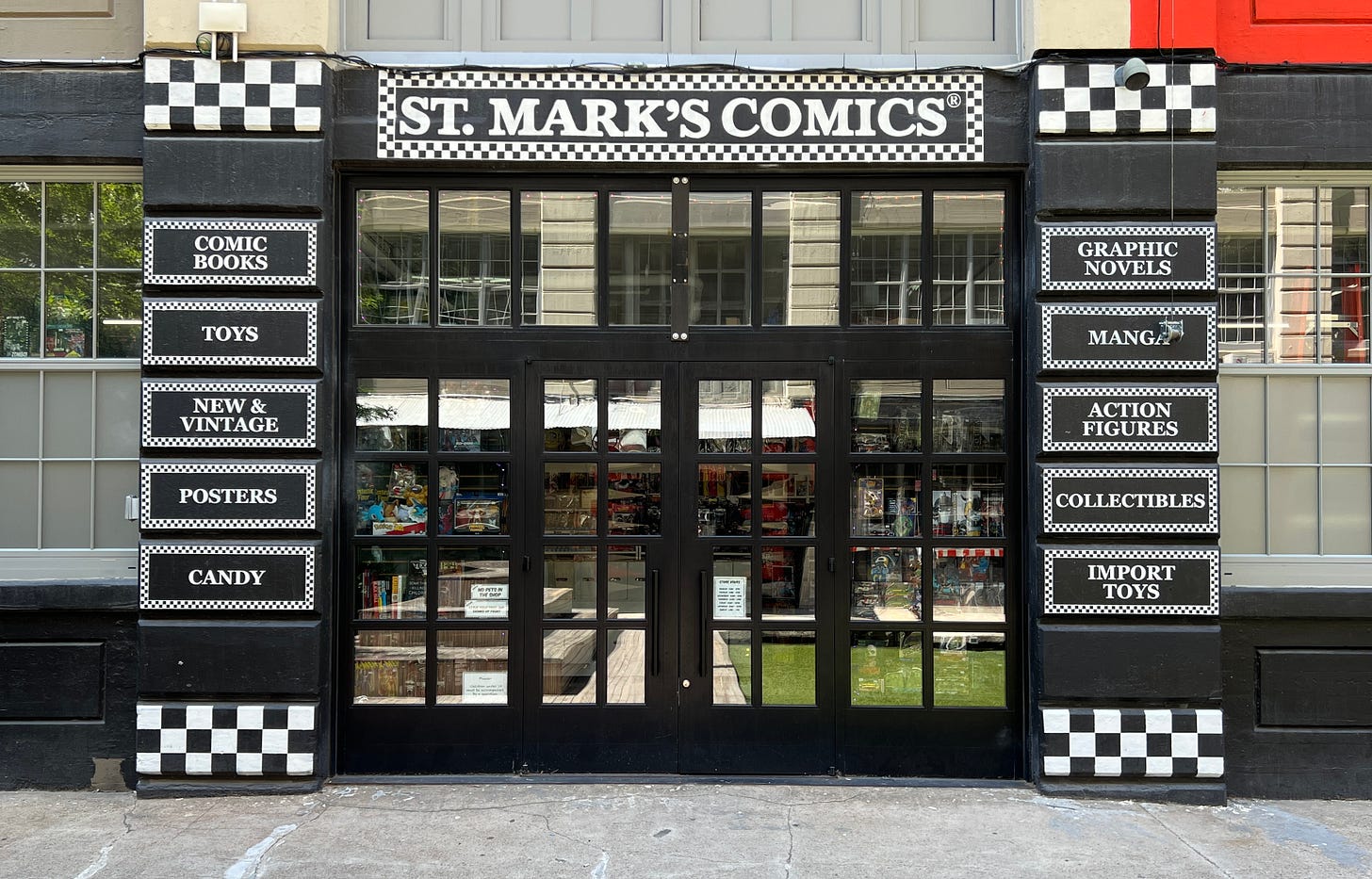Can the comic book shop survive?
Yes, according to Amalgam Comics’ Ariell Johnson and St. Mark’s Comics’ Mitch Cutler. But it’ll take a village.

It’s not an exaggeration to say it takes a superheroic effort to run a comic book shop, especially these days.
There are just so many forces conspiring against the largely mom and pop shops that make up a vast number of comic book stores. Beyond commercial rents surging in cities like New York, there is competition from online sellers and the growing popularity of digital comics.
Yet there are people who still see the value in providing in-person places for fans to gather. Because as fans know, it’s not just about shopping, it’s about connecting.
Mitch Cutler is one of these people. He has run New York City’s legendary St. Mark’s Comics for 40 years and has seen dramatic changes over the decades. “This industry is unrecognizable now,” he says, noting that toys and t-shirts and other ancillary merchandise was not part of the comic book shop business when he first opened his store. That’s all a big part of the business today, fueled by the sudden mainstream pop culture status of not just iconic characters like Spider-Man and Batman, but also those who also used to only have fans among the hardcore, like Black Panther and Rocket Raccoon.

The biggest draw at St. Mark’s Comics has always been, of course, the comic books themselves. “What sells now is what has always sold, which is good comics. It’s not about price. It’s about value. What sells really well are the classic stories and the things that are well written,” Cutler says. “They always triumph over everything else.”
It’s also about people more than anything.
While St. Mark’s Comics does sell online, convenience doesn’t top the personal touch. Comic book fans crave the experience of browsing through the store’s many racks in person, says Cutler, noting shoppers also rely on his staff’s expertise. “You want to be surrounded by people who like the same thing, people who know the things and can answer a question. ‘Hey, I really like The Dark Knight Returns. What else has Frank Miller done?’ You need somebody to tell you. You can look at all the recommendations in the world online, but none of that is the same as [talking to] someone who has read these books who can say, ‘You know, Batman: Year One is one of the greatest Batman stories ever, and it’s hardly about Batman,” Cutler says. “That kind of exchange and interaction is still valued by people.”
Like Cutler, Ariell Johnson considers the comic book shop an irreplaceable resource for comic book fans. Unfortunately, Johnson’s Philadelphia store, Amalgam Comics & Coffeeshop, closed in October 2022 after a seven-year run. The loss of business during the height of the Covid-19 pandemic proved catastrophic.
But Johnson, the first Black woman to own a comic book shop on the East Coast and a champion of diversity and inclusion whose store was written up in the New York Times and profiled by Great Big Story, has not thrown in the towel. The Amalgam Comics brand is very much alive.
In addition to pop up shops, Johnson is selling comics and merchandise online and runs a virtual book club. “Online is cool, and online makes it easy for more people to find their people,” Johnson says.
But—again—it’s just not the same as being part of a physical space filled with people. “It is just beneficial for us to come together. And whether you’re talking about video games, you’re talking about anime, manga, comics, novels, horror, it’s all storytelling,” she says, adding, “Who wants to tell a story to an empty room? The fact that we are all into storytelling in its different forms means there has to be a coming together. It makes sense for people to gather when stories are being exchanged.”
This belief in community was at the heart of Johnson’s decision to open Amalgam Comics, which was famous for hosting lots of events, in 2015. She recalls thinking, “What if the comic book store was more than just a place to buy your stuff? What if it was also the place where you hung out, you had conversations, you got to meet other people who were nerdy and into the stuff that you’re into? That was really the whole basis for it.”
Johnson hasn’t given up on finding a permanent physical space for Amalgam Comics. In fact, Amalgam Comics was recently named one of 10 finalists in the Making Space: Reimagining Recreation program. Sponsored by Philadelphia Parks & Recreation, four businesses will be awarded space to operate within a Philadelphia recreation center.
The rebirth of St. Mark’s Comics might serve as inspiration for Johnson. In 2019, Cutler shut down his original store, located in Manhattan’s East Village, because he was exhausted by the challenges of running a small business in New York City. “I was done. I worked 90 hours a week for 36 years,” he says.
After getting lots of sleep—“I slept for two months,” Cutler recalls—he began consulting for others in the comics books business and started missing the being around his staff and interacting with customers.
Cutler ultimately partnered with vintage toy purveyor Nick Giangarra, and they reopened St. Mark’s Comics in Brooklyn’s Industry City, a complex of massive warehouses in the Sunset Park neighborhood that is now home to entrepreneurs, artists, and restaurants. They’ll celebrate their second-year anniversary in Industry City on July 30.
Just like with your favorite heroes, nothing in comics stays dead forever.
Explore More:
🦸🏿♂️ Check out more from Amalgam Comics on Instagram, TikTok, Facebook, and Twitter
💭 Check out more from St. Mark’s Comics on Instagram, Facebook, and Twitter




